Graduation and Personal Growth: A Reflective Essay Using Theories
VerifiedAdded on 2023/04/04
|7
|1601
|227
Essay
AI Summary
This essay reflects on the author's personal development during the period surrounding graduation from school, analyzing the experience through the lens of Erik Erikson's theory of psychosocial development, specifically the 'Identity vs. Role Confusion' stage, and Urie Bronfenbrenner's ecological systems theory, focusing on the 'Exosystem'. The author discusses the emotional impact of leaving home and friends, the identity crisis faced when contemplating future ambitions, and the influence of various individuals within their 'Exosystem,' including family, teachers, and new acquaintances. The essay further explores the challenges of managing time, navigating social expectations, and developing a personal sense of self amidst the pressures of impending adulthood. Ultimately, the author reflects on the lessons learned regarding patience, ethics, and the importance of self-discovery, concluding that the journey, though tumultuous, has led to positive personal growth and a clearer sense of identity. The essay fulfills requirements of the Bachelor of Community Services assessment, including references to scholarly articles and required textbooks.
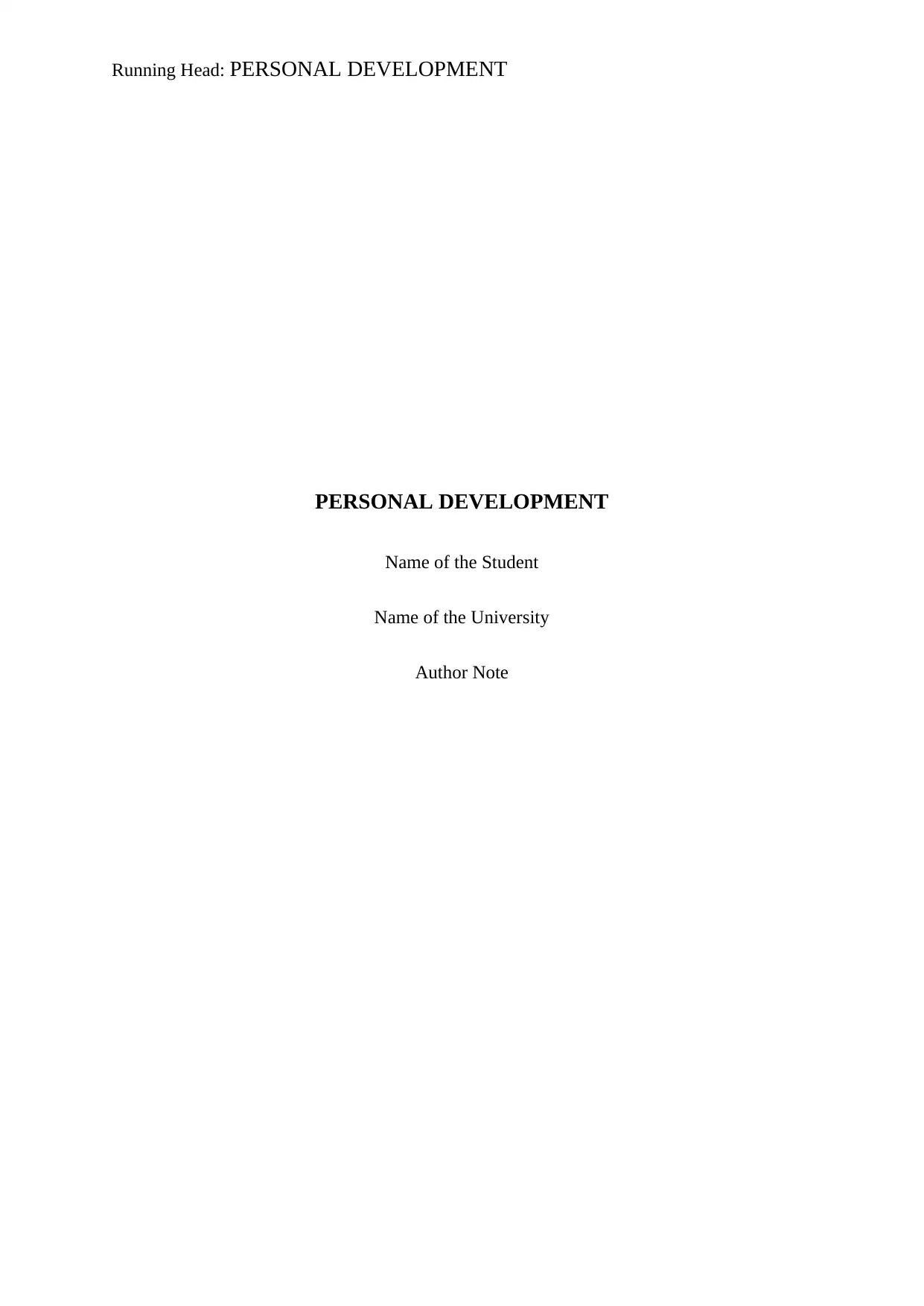
Running Head: PERSONAL DEVELOPMENT
PERSONAL DEVELOPMENT
Name of the Student
Name of the University
Author Note
PERSONAL DEVELOPMENT
Name of the Student
Name of the University
Author Note
Paraphrase This Document
Need a fresh take? Get an instant paraphrase of this document with our AI Paraphraser
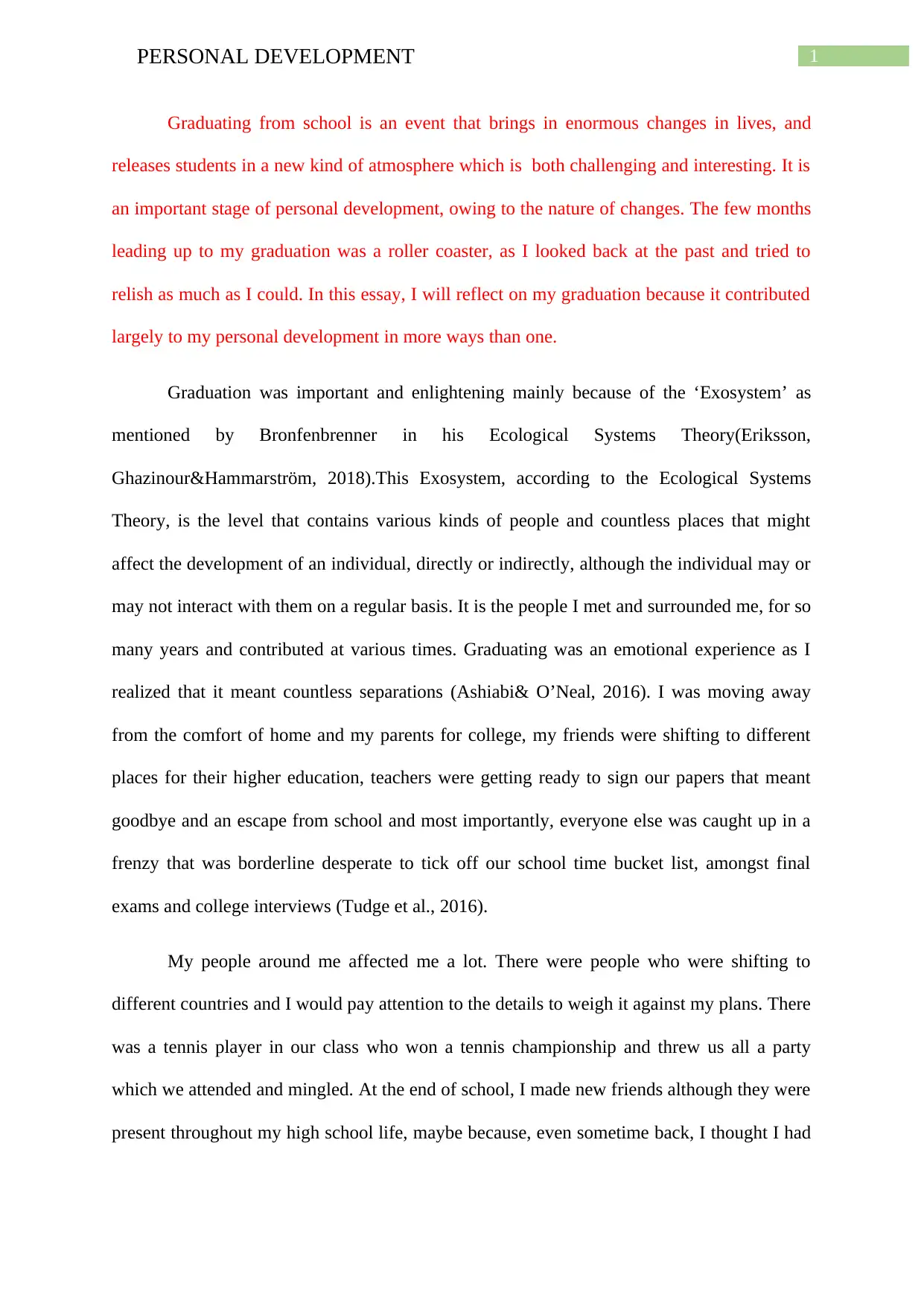
1PERSONAL DEVELOPMENT
Graduating from school is an event that brings in enormous changes in lives, and
releases students in a new kind of atmosphere which is both challenging and interesting. It is
an important stage of personal development, owing to the nature of changes. The few months
leading up to my graduation was a roller coaster, as I looked back at the past and tried to
relish as much as I could. In this essay, I will reflect on my graduation because it contributed
largely to my personal development in more ways than one.
Graduation was important and enlightening mainly because of the ‘Exosystem’ as
mentioned by Bronfenbrenner in his Ecological Systems Theory(Eriksson,
Ghazinour&Hammarström, 2018).This Exosystem, according to the Ecological Systems
Theory, is the level that contains various kinds of people and countless places that might
affect the development of an individual, directly or indirectly, although the individual may or
may not interact with them on a regular basis. It is the people I met and surrounded me, for so
many years and contributed at various times. Graduating was an emotional experience as I
realized that it meant countless separations (Ashiabi& O’Neal, 2016). I was moving away
from the comfort of home and my parents for college, my friends were shifting to different
places for their higher education, teachers were getting ready to sign our papers that meant
goodbye and an escape from school and most importantly, everyone else was caught up in a
frenzy that was borderline desperate to tick off our school time bucket list, amongst final
exams and college interviews (Tudge et al., 2016).
My people around me affected me a lot. There were people who were shifting to
different countries and I would pay attention to the details to weigh it against my plans. There
was a tennis player in our class who won a tennis championship and threw us all a party
which we attended and mingled. At the end of school, I made new friends although they were
present throughout my high school life, maybe because, even sometime back, I thought I had
Graduating from school is an event that brings in enormous changes in lives, and
releases students in a new kind of atmosphere which is both challenging and interesting. It is
an important stage of personal development, owing to the nature of changes. The few months
leading up to my graduation was a roller coaster, as I looked back at the past and tried to
relish as much as I could. In this essay, I will reflect on my graduation because it contributed
largely to my personal development in more ways than one.
Graduation was important and enlightening mainly because of the ‘Exosystem’ as
mentioned by Bronfenbrenner in his Ecological Systems Theory(Eriksson,
Ghazinour&Hammarström, 2018).This Exosystem, according to the Ecological Systems
Theory, is the level that contains various kinds of people and countless places that might
affect the development of an individual, directly or indirectly, although the individual may or
may not interact with them on a regular basis. It is the people I met and surrounded me, for so
many years and contributed at various times. Graduating was an emotional experience as I
realized that it meant countless separations (Ashiabi& O’Neal, 2016). I was moving away
from the comfort of home and my parents for college, my friends were shifting to different
places for their higher education, teachers were getting ready to sign our papers that meant
goodbye and an escape from school and most importantly, everyone else was caught up in a
frenzy that was borderline desperate to tick off our school time bucket list, amongst final
exams and college interviews (Tudge et al., 2016).
My people around me affected me a lot. There were people who were shifting to
different countries and I would pay attention to the details to weigh it against my plans. There
was a tennis player in our class who won a tennis championship and threw us all a party
which we attended and mingled. At the end of school, I made new friends although they were
present throughout my high school life, maybe because, even sometime back, I thought I had
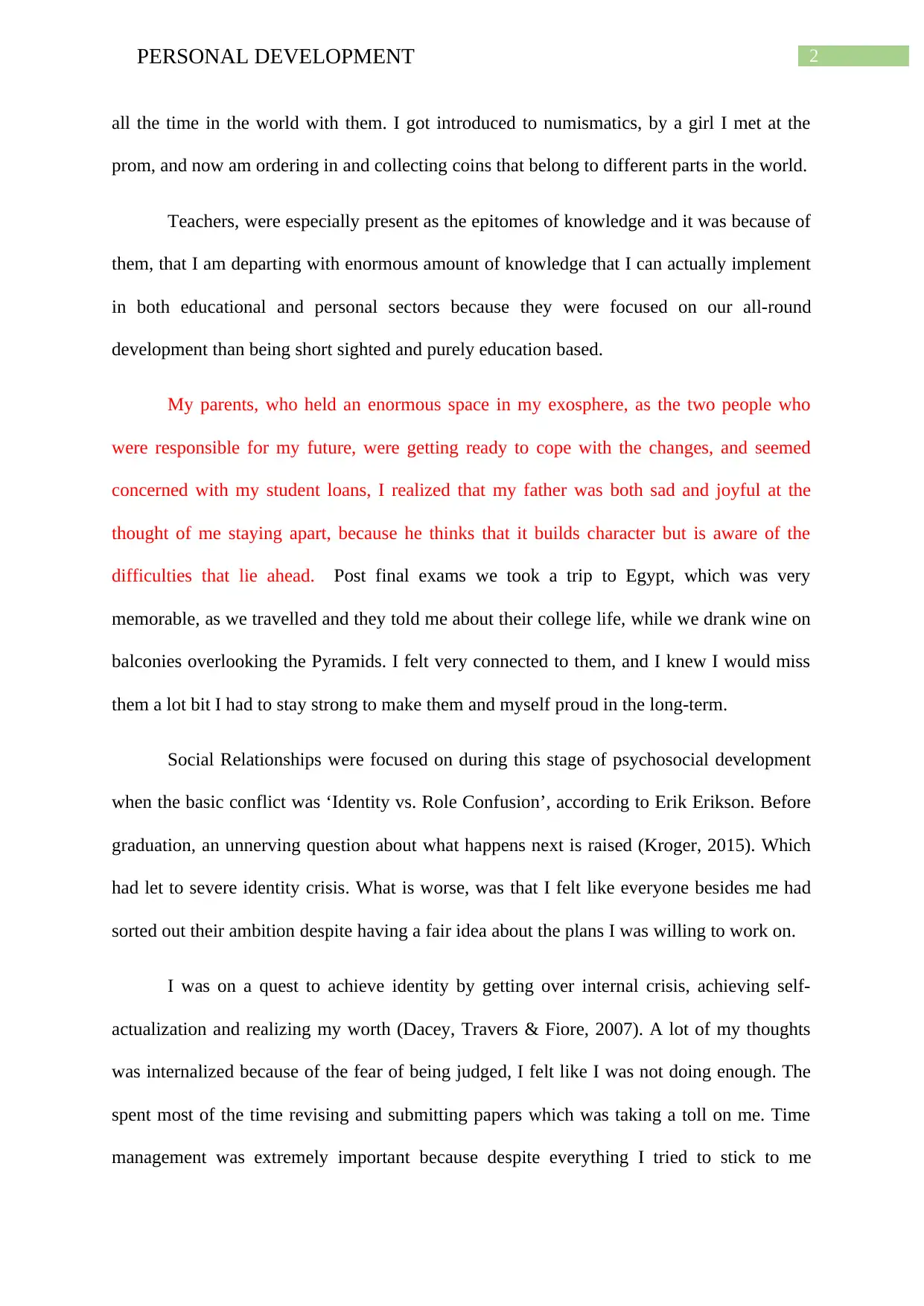
2PERSONAL DEVELOPMENT
all the time in the world with them. I got introduced to numismatics, by a girl I met at the
prom, and now am ordering in and collecting coins that belong to different parts in the world.
Teachers, were especially present as the epitomes of knowledge and it was because of
them, that I am departing with enormous amount of knowledge that I can actually implement
in both educational and personal sectors because they were focused on our all-round
development than being short sighted and purely education based.
My parents, who held an enormous space in my exosphere, as the two people who
were responsible for my future, were getting ready to cope with the changes, and seemed
concerned with my student loans, I realized that my father was both sad and joyful at the
thought of me staying apart, because he thinks that it builds character but is aware of the
difficulties that lie ahead. Post final exams we took a trip to Egypt, which was very
memorable, as we travelled and they told me about their college life, while we drank wine on
balconies overlooking the Pyramids. I felt very connected to them, and I knew I would miss
them a lot bit I had to stay strong to make them and myself proud in the long-term.
Social Relationships were focused on during this stage of psychosocial development
when the basic conflict was ‘Identity vs. Role Confusion’, according to Erik Erikson. Before
graduation, an unnerving question about what happens next is raised (Kroger, 2015). Which
had let to severe identity crisis. What is worse, was that I felt like everyone besides me had
sorted out their ambition despite having a fair idea about the plans I was willing to work on.
I was on a quest to achieve identity by getting over internal crisis, achieving self-
actualization and realizing my worth (Dacey, Travers & Fiore, 2007). A lot of my thoughts
was internalized because of the fear of being judged, I felt like I was not doing enough. The
spent most of the time revising and submitting papers which was taking a toll on me. Time
management was extremely important because despite everything I tried to stick to me
all the time in the world with them. I got introduced to numismatics, by a girl I met at the
prom, and now am ordering in and collecting coins that belong to different parts in the world.
Teachers, were especially present as the epitomes of knowledge and it was because of
them, that I am departing with enormous amount of knowledge that I can actually implement
in both educational and personal sectors because they were focused on our all-round
development than being short sighted and purely education based.
My parents, who held an enormous space in my exosphere, as the two people who
were responsible for my future, were getting ready to cope with the changes, and seemed
concerned with my student loans, I realized that my father was both sad and joyful at the
thought of me staying apart, because he thinks that it builds character but is aware of the
difficulties that lie ahead. Post final exams we took a trip to Egypt, which was very
memorable, as we travelled and they told me about their college life, while we drank wine on
balconies overlooking the Pyramids. I felt very connected to them, and I knew I would miss
them a lot bit I had to stay strong to make them and myself proud in the long-term.
Social Relationships were focused on during this stage of psychosocial development
when the basic conflict was ‘Identity vs. Role Confusion’, according to Erik Erikson. Before
graduation, an unnerving question about what happens next is raised (Kroger, 2015). Which
had let to severe identity crisis. What is worse, was that I felt like everyone besides me had
sorted out their ambition despite having a fair idea about the plans I was willing to work on.
I was on a quest to achieve identity by getting over internal crisis, achieving self-
actualization and realizing my worth (Dacey, Travers & Fiore, 2007). A lot of my thoughts
was internalized because of the fear of being judged, I felt like I was not doing enough. The
spent most of the time revising and submitting papers which was taking a toll on me. Time
management was extremely important because despite everything I tried to stick to me
⊘ This is a preview!⊘
Do you want full access?
Subscribe today to unlock all pages.

Trusted by 1+ million students worldwide
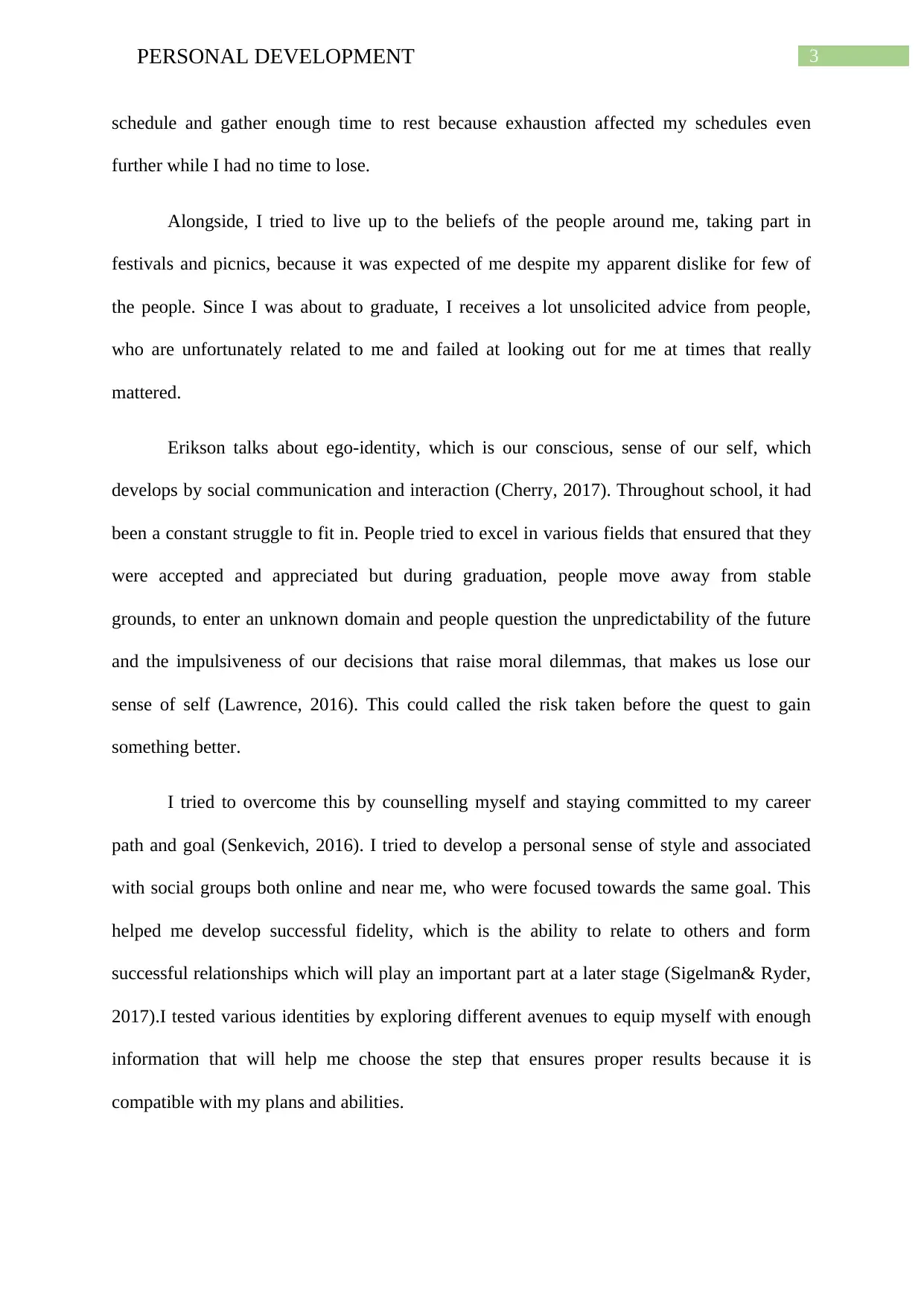
3PERSONAL DEVELOPMENT
schedule and gather enough time to rest because exhaustion affected my schedules even
further while I had no time to lose.
Alongside, I tried to live up to the beliefs of the people around me, taking part in
festivals and picnics, because it was expected of me despite my apparent dislike for few of
the people. Since I was about to graduate, I receives a lot unsolicited advice from people,
who are unfortunately related to me and failed at looking out for me at times that really
mattered.
Erikson talks about ego-identity, which is our conscious, sense of our self, which
develops by social communication and interaction (Cherry, 2017). Throughout school, it had
been a constant struggle to fit in. People tried to excel in various fields that ensured that they
were accepted and appreciated but during graduation, people move away from stable
grounds, to enter an unknown domain and people question the unpredictability of the future
and the impulsiveness of our decisions that raise moral dilemmas, that makes us lose our
sense of self (Lawrence, 2016). This could called the risk taken before the quest to gain
something better.
I tried to overcome this by counselling myself and staying committed to my career
path and goal (Senkevich, 2016). I tried to develop a personal sense of style and associated
with social groups both online and near me, who were focused towards the same goal. This
helped me develop successful fidelity, which is the ability to relate to others and form
successful relationships which will play an important part at a later stage (Sigelman& Ryder,
2017).I tested various identities by exploring different avenues to equip myself with enough
information that will help me choose the step that ensures proper results because it is
compatible with my plans and abilities.
schedule and gather enough time to rest because exhaustion affected my schedules even
further while I had no time to lose.
Alongside, I tried to live up to the beliefs of the people around me, taking part in
festivals and picnics, because it was expected of me despite my apparent dislike for few of
the people. Since I was about to graduate, I receives a lot unsolicited advice from people,
who are unfortunately related to me and failed at looking out for me at times that really
mattered.
Erikson talks about ego-identity, which is our conscious, sense of our self, which
develops by social communication and interaction (Cherry, 2017). Throughout school, it had
been a constant struggle to fit in. People tried to excel in various fields that ensured that they
were accepted and appreciated but during graduation, people move away from stable
grounds, to enter an unknown domain and people question the unpredictability of the future
and the impulsiveness of our decisions that raise moral dilemmas, that makes us lose our
sense of self (Lawrence, 2016). This could called the risk taken before the quest to gain
something better.
I tried to overcome this by counselling myself and staying committed to my career
path and goal (Senkevich, 2016). I tried to develop a personal sense of style and associated
with social groups both online and near me, who were focused towards the same goal. This
helped me develop successful fidelity, which is the ability to relate to others and form
successful relationships which will play an important part at a later stage (Sigelman& Ryder,
2017).I tested various identities by exploring different avenues to equip myself with enough
information that will help me choose the step that ensures proper results because it is
compatible with my plans and abilities.
Paraphrase This Document
Need a fresh take? Get an instant paraphrase of this document with our AI Paraphraser
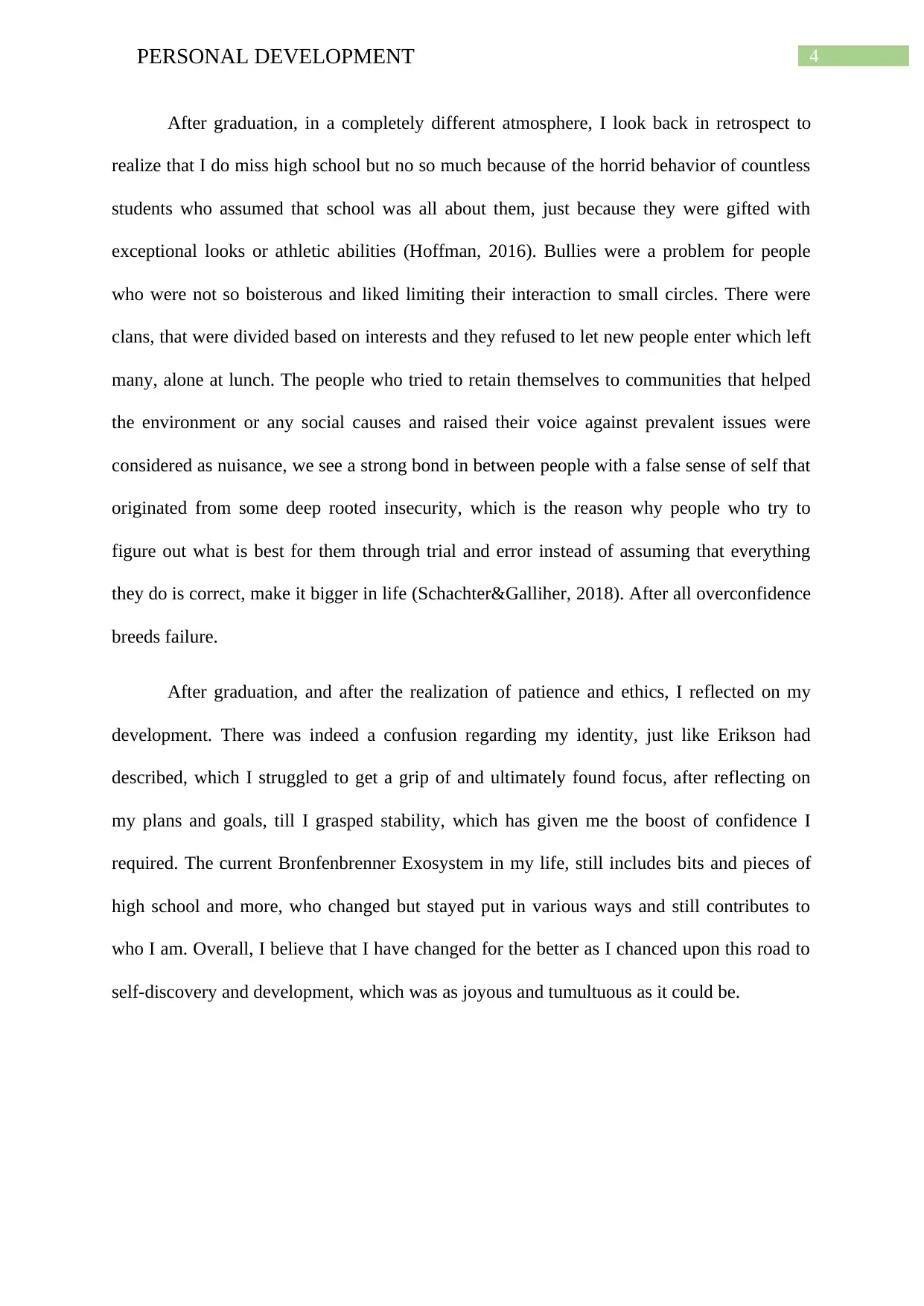
4PERSONAL DEVELOPMENT
After graduation, in a completely different atmosphere, I look back in retrospect to
realize that I do miss high school but no so much because of the horrid behavior of countless
students who assumed that school was all about them, just because they were gifted with
exceptional looks or athletic abilities (Hoffman, 2016). Bullies were a problem for people
who were not so boisterous and liked limiting their interaction to small circles. There were
clans, that were divided based on interests and they refused to let new people enter which left
many, alone at lunch. The people who tried to retain themselves to communities that helped
the environment or any social causes and raised their voice against prevalent issues were
considered as nuisance, we see a strong bond in between people with a false sense of self that
originated from some deep rooted insecurity, which is the reason why people who try to
figure out what is best for them through trial and error instead of assuming that everything
they do is correct, make it bigger in life (Schachter&Galliher, 2018). After all overconfidence
breeds failure.
After graduation, and after the realization of patience and ethics, I reflected on my
development. There was indeed a confusion regarding my identity, just like Erikson had
described, which I struggled to get a grip of and ultimately found focus, after reflecting on
my plans and goals, till I grasped stability, which has given me the boost of confidence I
required. The current Bronfenbrenner Exosystem in my life, still includes bits and pieces of
high school and more, who changed but stayed put in various ways and still contributes to
who I am. Overall, I believe that I have changed for the better as I chanced upon this road to
self-discovery and development, which was as joyous and tumultuous as it could be.
After graduation, in a completely different atmosphere, I look back in retrospect to
realize that I do miss high school but no so much because of the horrid behavior of countless
students who assumed that school was all about them, just because they were gifted with
exceptional looks or athletic abilities (Hoffman, 2016). Bullies were a problem for people
who were not so boisterous and liked limiting their interaction to small circles. There were
clans, that were divided based on interests and they refused to let new people enter which left
many, alone at lunch. The people who tried to retain themselves to communities that helped
the environment or any social causes and raised their voice against prevalent issues were
considered as nuisance, we see a strong bond in between people with a false sense of self that
originated from some deep rooted insecurity, which is the reason why people who try to
figure out what is best for them through trial and error instead of assuming that everything
they do is correct, make it bigger in life (Schachter&Galliher, 2018). After all overconfidence
breeds failure.
After graduation, and after the realization of patience and ethics, I reflected on my
development. There was indeed a confusion regarding my identity, just like Erikson had
described, which I struggled to get a grip of and ultimately found focus, after reflecting on
my plans and goals, till I grasped stability, which has given me the boost of confidence I
required. The current Bronfenbrenner Exosystem in my life, still includes bits and pieces of
high school and more, who changed but stayed put in various ways and still contributes to
who I am. Overall, I believe that I have changed for the better as I chanced upon this road to
self-discovery and development, which was as joyous and tumultuous as it could be.
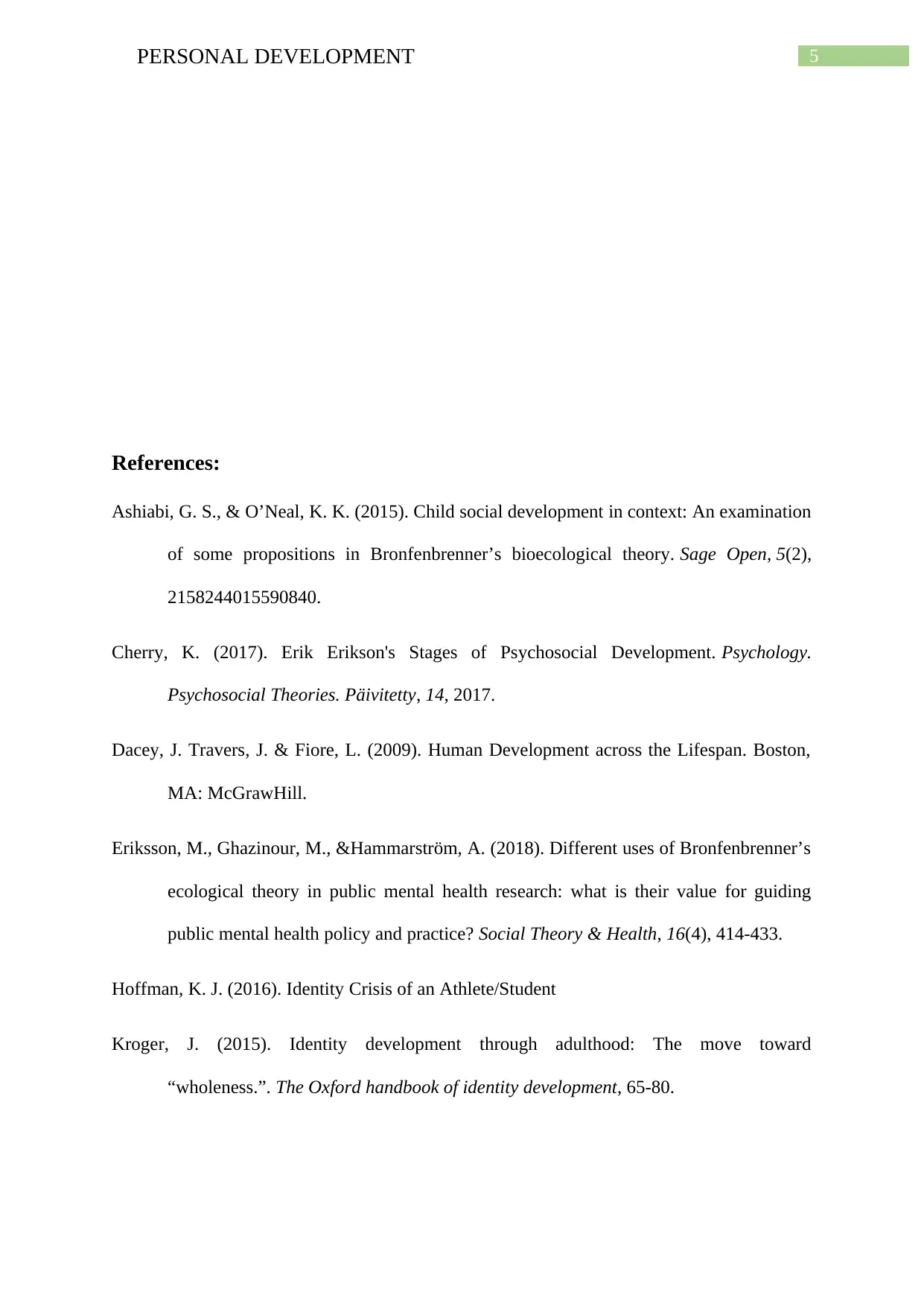
5PERSONAL DEVELOPMENT
References:
Ashiabi, G. S., & O’Neal, K. K. (2015). Child social development in context: An examination
of some propositions in Bronfenbrenner’s bioecological theory. Sage Open, 5(2),
2158244015590840.
Cherry, K. (2017). Erik Erikson's Stages of Psychosocial Development. Psychology.
Psychosocial Theories. Päivitetty, 14, 2017.
Dacey, J. Travers, J. & Fiore, L. (2009). Human Development across the Lifespan. Boston,
MA: McGrawHill.
Eriksson, M., Ghazinour, M., &Hammarström, A. (2018). Different uses of Bronfenbrenner’s
ecological theory in public mental health research: what is their value for guiding
public mental health policy and practice? Social Theory & Health, 16(4), 414-433.
Hoffman, K. J. (2016). Identity Crisis of an Athlete/Student
Kroger, J. (2015). Identity development through adulthood: The move toward
“wholeness.”. The Oxford handbook of identity development, 65-80.
References:
Ashiabi, G. S., & O’Neal, K. K. (2015). Child social development in context: An examination
of some propositions in Bronfenbrenner’s bioecological theory. Sage Open, 5(2),
2158244015590840.
Cherry, K. (2017). Erik Erikson's Stages of Psychosocial Development. Psychology.
Psychosocial Theories. Päivitetty, 14, 2017.
Dacey, J. Travers, J. & Fiore, L. (2009). Human Development across the Lifespan. Boston,
MA: McGrawHill.
Eriksson, M., Ghazinour, M., &Hammarström, A. (2018). Different uses of Bronfenbrenner’s
ecological theory in public mental health research: what is their value for guiding
public mental health policy and practice? Social Theory & Health, 16(4), 414-433.
Hoffman, K. J. (2016). Identity Crisis of an Athlete/Student
Kroger, J. (2015). Identity development through adulthood: The move toward
“wholeness.”. The Oxford handbook of identity development, 65-80.
⊘ This is a preview!⊘
Do you want full access?
Subscribe today to unlock all pages.

Trusted by 1+ million students worldwide
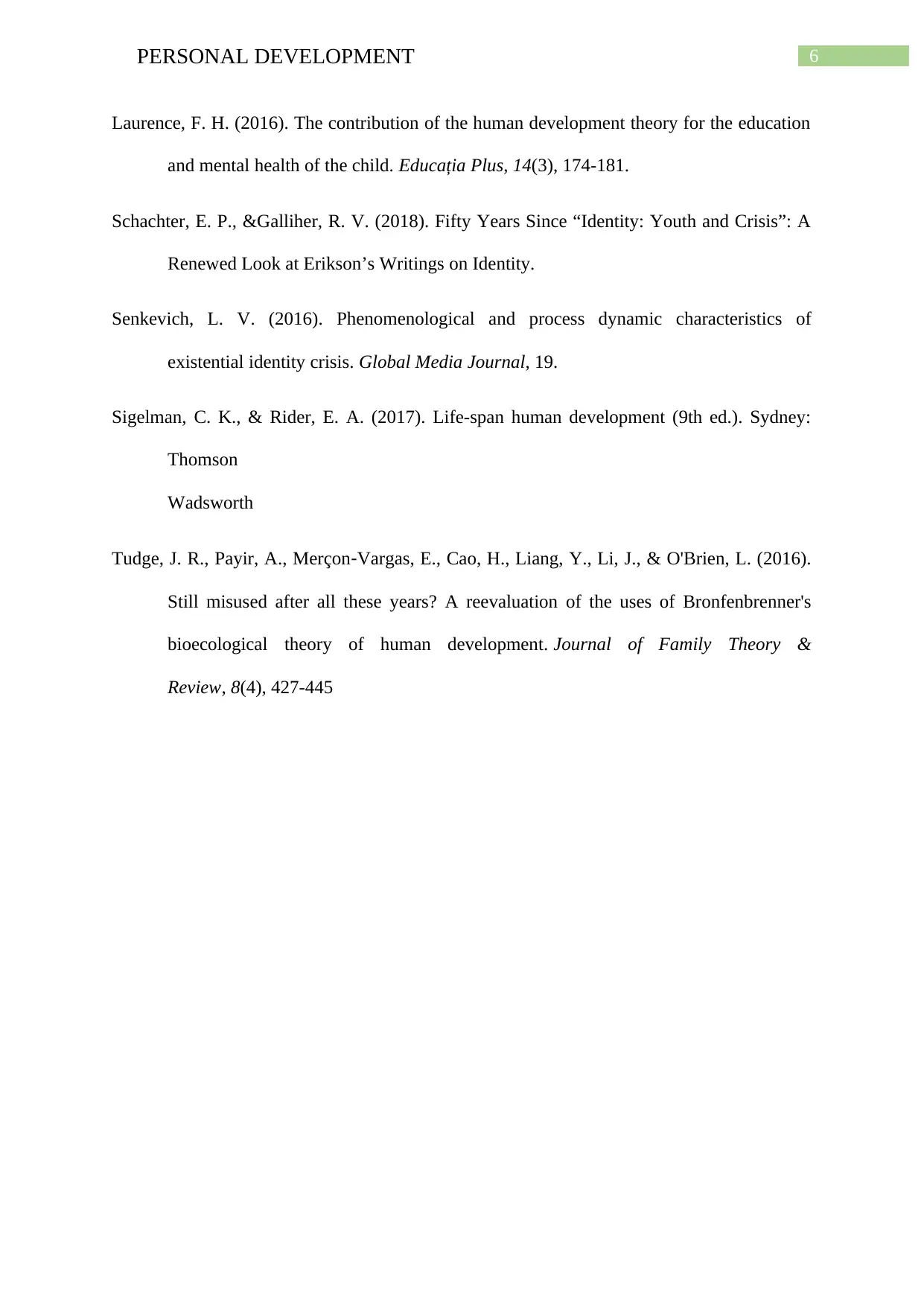
6PERSONAL DEVELOPMENT
Laurence, F. H. (2016). The contribution of the human development theory for the education
and mental health of the child. Educația Plus, 14(3), 174-181.
Schachter, E. P., &Galliher, R. V. (2018). Fifty Years Since “Identity: Youth and Crisis”: A
Renewed Look at Erikson’s Writings on Identity.
Senkevich, L. V. (2016). Phenomenological and process dynamic characteristics of
existential identity crisis. Global Media Journal, 19.
Sigelman, C. K., & Rider, E. A. (2017). Life-span human development (9th ed.). Sydney:
Thomson
Wadsworth
Tudge, J. R., Payir, A., Merçon‐Vargas, E., Cao, H., Liang, Y., Li, J., & O'Brien, L. (2016).
Still misused after all these years? A reevaluation of the uses of Bronfenbrenner's
bioecological theory of human development. Journal of Family Theory &
Review, 8(4), 427-445
Laurence, F. H. (2016). The contribution of the human development theory for the education
and mental health of the child. Educația Plus, 14(3), 174-181.
Schachter, E. P., &Galliher, R. V. (2018). Fifty Years Since “Identity: Youth and Crisis”: A
Renewed Look at Erikson’s Writings on Identity.
Senkevich, L. V. (2016). Phenomenological and process dynamic characteristics of
existential identity crisis. Global Media Journal, 19.
Sigelman, C. K., & Rider, E. A. (2017). Life-span human development (9th ed.). Sydney:
Thomson
Wadsworth
Tudge, J. R., Payir, A., Merçon‐Vargas, E., Cao, H., Liang, Y., Li, J., & O'Brien, L. (2016).
Still misused after all these years? A reevaluation of the uses of Bronfenbrenner's
bioecological theory of human development. Journal of Family Theory &
Review, 8(4), 427-445
1 out of 7
Related Documents
Your All-in-One AI-Powered Toolkit for Academic Success.
+13062052269
info@desklib.com
Available 24*7 on WhatsApp / Email
![[object Object]](/_next/static/media/star-bottom.7253800d.svg)
Unlock your academic potential
Copyright © 2020–2026 A2Z Services. All Rights Reserved. Developed and managed by ZUCOL.





